1. A Nerdy Child
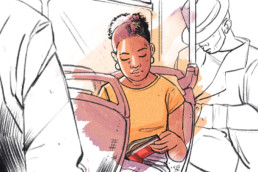
Zanele Mbali was born in Cape Town in 1988, to a family of high school teachers. Her mother left the family when Zanele turned five (she had a bipolar disorder and was unable to receive help locally). It was Zanele’s dad (who taught programming at high school) and her grandmother (who stayed home) that brought her up.
Since childhood, Zanele has shown a keen interest in technology, and specifically in video games. She was also a devoted reader of fiction. Zanele turned out to be a smart but reserved child; at school, she never had any close friends. Looking back at her childhood, Zanele once remarked that it’s quite possible she had a mild form of ADHD, which people simply saw as “being socially awkward”.
At high school, Zanele regularly enrolled in competitions, winning several awards for her projects. Her room was cluttered with notebooks full of design notes.
In 2012, Zanele graduated from CPUT (Cape Peninsula University of Technology), where she majored in Computer Science. Her father by then had passed away (due to complications of chronic plasmodium malaria), but her grandmother was still around, and came to support Zanele at her graduation ceremony.
From 2012 to 2015, Zanele worked for a string of IT companies (mostly dealing with mobile networks) as a backend developer. None of these companies seemed like the right fit for her, and the atmosphere at work was often stressful and sexist. Even though Zanele dreamed of making video games, she couldn’t find any relevant position; at that time, the games industry was still underdeveloped in South Africa.
Eventually, Zanele started coding a prototype of her own game, working on it whenever she has some free time (and during all the weekends).
2. An Unhappy Marriage
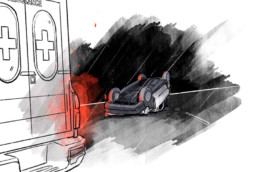
In 2015 Zanele succumbed to social pressure and married Oskar Nilsson, a stock trader: she felt lonely, and she wondered if, since her professional life holds little promise, it was time to try to start a family and find her meaning there.
Zenele’s life with Oskar was miserable: he was hot-tempered, extremely jealous, and abusive (even though he seemed like a prince charming to the outside world). In the privacy of their home, he beat Zanele quite regularly. One day, it resulted in her losing their unborn child.
In late 2016, Oskar and Zanele got into a car accident: Oskar drove their BMW M3 while intoxicated. Oskar died in the hospital from injuries. As for Zanele, her physical rehabilitation took more than six months. She lost her job; she suffered from a chronic migraine, a clinical depression, and she began to regularly experience panic attacks.
3. A Lucky Encounter
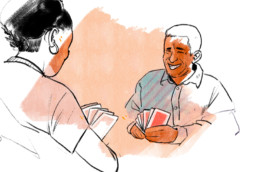
While Zanele was treated at the hospital for car injuries, her grandmother has passed away. Unable to find a new job, and left completely on her own, Zanele got addicted to alcohol.
On Christmas Day in 2016, which fell on Sunday, she tried to commit suicide with an overdose of sleeping pills. She was saved by the paramedics.
Zanele’s life changed radically in 2017 when she met Dr. Ricardo Vargas, a pediatric surgeon who came to Cape Town from Baharosa to work at the Red Cross War Memorial Children’s Hospital.
An intelligent and emphatic man, Ricardo convinced Zanele to overcome her addiction, one step at a time, and worked patiently to restore her self-confidence.
Ricardo convinced Zanele to start visiting a psychiatrist, and following a few months of therapy, her headaches and her panic attacks have mostly ceased.
Ricardo and Zanele married in the spring of 2018. Ricardo’s whole family flew in from Baharosa for the occasion, including his three sisters who maintained a close relationship between all the siblings. Ricardo’s best friend from the medical school, Ignacio Dube, also flew in from Cuba.
4. A New Beginning

In 2019, once Zanele’s therapy sessions were finished, Zanele felt ready to return to work. She considered going back to IT, perhaps at Ricardo’s hospital – perhaps at one of the new startups. What she dreamed of, was applying for a job in the games industry – yet there were no openings in Cape Town.
Ricardo suggested that Zanele send the prototype of the game that she had made some years earlier to Liam Dube – a nephew of Ignacio Dube, his best friend from the medical school. Ricardo recalled that Ignacio was very proud of Liam, who was a co-founder of a games studio called Red Dawn, located in the north of Africa, in Marzaria.
After a few weeks of hesitation, Zanele found the backups of the code written years ago and brought the prototype up to date. With the gentle support of Ricardo, she finally felt ready to share her work, and uploaded the playable build for Red Dawn to test.
Liam and his colleagues at Red Daw loved the prototype, and Liam and Zanele spent the next few days emailing back and forth, before jumping on a Zoom call where Liam proposed that Zanele joins them on-site in Marzaria, to turn her prototype into a proper commercial game, working as a part of the full-time development team.
5. True Indies
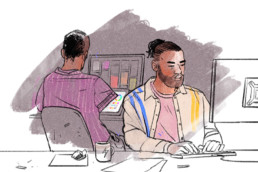
The founders of Red Dawn, Liam Dube and his childhood friend Rohan Rao, were self-made men. They both came from poor families and grew up with many siblings – most of whom have left Marzaria for other countries in pursuit of education and professional fulfillment (such as Liam’s uncle Ignacio, who went to study and work in Cuba, focusing on the application of CIMAvax-EGF, the pioneering Cuban vaccine for treating lung cancer).
Video games were always Liam and Rohan’s passion, and the friends worked hard for several years on construction sites (weekends) and in retail shops (weekdays) to save money so that they could hire a small dev team and create their first games project.
Among the two friends, Liam was the person who organized things, while Rohan, even though he lacked any formal education, was an artist with a gift from heaven.
After an accident on one of the construction sites, when an exhausted underpaid machine operator who worked two shifts in a row lost control of a crane, Rohan lost his right arm. This, however, didn’t stop him and Liam from pursuing their dream: originally right-handed, Rohan taught himself how to draw with his left hand, and after a few weeks of recovery continued working on their games projects.
When they started hiring their first employees, Liam and Rohan pledged to work with the local talent, so that a small games industry community could develop in Marzaria. They did their best to pay decent salaries and were fair to their (at that time, all-male) team.
The first project of Liam and Rohan, Invaders from Hell, wasn’t a commercial success, even though it won a few local awards and got nominations for its unique art style (created by Rohan). Most players reviewing the game agreed that while the game was polished and showed attention to detail, it lacked vision and ambition and offered only secondary, uninspired mechanics as its core loop. But Liam and Rohan weren’t giving up.
6. A Bout of Luck
In 2020, Zanele accepted the offer to work at Red Dawn as a game designer, and moved to Marzaria just before the travel restrictions due to SARS2 (COVID-19) went up in the region.
Red Dawn commenced the development of their latest game: Twin Blades, a project based on Zanele’s original prototype.
Ricardo was very supportive, as he understood that Ricardo understood that the opportunity for professional actualization of Zanele is more important than them staying together in Cape Town.
Ricardo visited Zanele in Marzaria as regularly as he could. As a doctor, he could travel more easily than others, and whenever he could, he volunteered for the projects of the recently established Africa Centres for Disease Control and Prevention related to the mitigation of the SARS2 pandemics, which took him to the north more often.
One day, Ricardo presented Zanele with the painting that he commissioned with a local artist, inspired by their love. He called it “Twin Hearts”.
Ricardo and Zanele planned to have a child once they could move in together – perhaps, after Zanele’s games project is released, or when Ricardo’s term at the Cape Town hospital ends, and he can opt for placement in Marzaria.
A few times, Zanele tried to convince Liam and Rohan at Red Dawn that she could work on the game remotely – but they never agreed, insisting that a culture of in-person all-hand meetings is essential to their production style.
7. A Terrible Loss
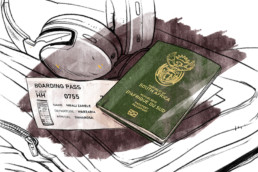
In 2021, Dr. Vargas drowned while swimming in Cape Town’s False Bay. This almost broke Zanele, and her post-crash symptoms returned. Her psychological state became highly unstable; despite having a job that she enjoyed, she felt lonelier than ever.
Zanele’s condition further worsened due to the production crunches that Red Dawn was going through at that time, as development issues piled up and the studio was running short of money. While Zanele was immersed in her own misery, Liam and Rohan were very conscious of the jobs of their teammates being at stake, should Twin Blades fail at launch.
Two months after the tragic death of Ricardo, Zanele decided to give birth to the child that she and Ricardo had dreamed of – via IVF with the frozen sperm of Ricardo. When she talked about this with the hospital where Ricardo worked at, its management agreed to cover the cost of the procedure, in the honor of the doctor whom everyone dearly loved.
Zanele’s decision to have a child led to a confrontation with the founders of Red Dawn, who didn’t believe that Zanele, as a pregnant woman – and a future single mom! – could handle the intensive workload that was expected from a game designer of a project about to be released into live service. Liam and Rohan pressured Zanele, trying to make her change her mind about having that child, but she didn’t accept their reasoning.
After a series of stressful conversations at the studio, Zanele resigned from Red Dawn –leaving the unfinished game, to which she has contributed so much. Feeling that she couldn’t stay in Africa, with bad memories at every turn, Zanele moved across the Atlantic to Baharosa, where Ricardo’s extended family was based. Ricardo’s sisters were very kind to Zanele and supported her dream to conceive and raise Ricardo’s child.
In 2022, Zanele gave birth to a beautiful baby girl, Chaniya Vargas (Zanele named the child in the memory of her grandmother and insisted on giving her Ricardo’s surname).
8. The Pains of Birth
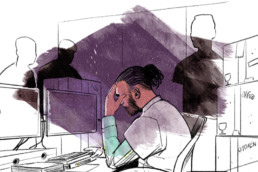
After the loss of the game’s lead designer, the development of Twin Blades at Red Dawn turned into an absolute hell. Liam and Rohan had to move the release date twice, even though the studio ran out of money and owed large amounts to everyone, from the landlord of their office building to the employees whom they couldn’t pay full salaries. At one point, Rohan sold his own modest house and moved to live at the studio. It helped to avoid layoffs for a while, yet it was just a temporary solution.
Red Dawn got lucky when a MENA-focused bizdev at a new PC games platform, Mega, saw the trailer of Twin Blades at Africa Games Week, and offered a distribution agreement, with a substantial advance, in exchange for a period of exclusivity on Mega’s upcoming store.
Both Liam and Rohan worked day and night, which resulted in burnout and health issues. It also led to Liam’s divorce: his wife left him and took both of their kids. Even though Liam was known as an unbreakable person, he found himself in a dark place.
After a period of horrible production crunch, in the summer of 2022, Red Dawn released Twin Blades into operation, on PC as well as on consoles (there was some controversy in the community about the exclusivity deal with Mega, but after Liam explained that the funding from Mega was the only thing that allowed the studio not to bankrupt).
Soon after the game’s release, Rohan got hospitalized due to an overdose of heroin, and experienced clinical death (he became addicted in the runaway to launch, to compensate stress). While at the hospital, where pandemics protocols got ditched, Rohan got a nosocomial infection of SARS2 (his third), which took him some months to overcome.
Worrying about his best friend and partner, Liam blamed Zanele, who, as he said in one of the interviews, “abandoned the team at the worst possible moment, depriving him of his family and almost killing his co-founder, Rohan.”
9. The Fruits of Labor
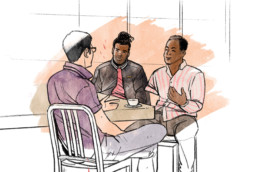
After a few weeks of good (but not exceptional) post-release publicity, Twin Blades got noticed by a prominent Korean streamer GEIM-AESEU78 and became a runaway hit.
Even though Liam and Rohan rejected some of Zanele’s more ambitious design ideas, players all over the world loved the project and just couldn’t stop playing it. The game was popularly described as “a complicated case of simple mechanics”.
Twin Blades received multiple fan translations, including into Chinese, Japanese and Korean, the languages that Red Dawn originally could not afford to localize into due to a very limited budget.
In Marzaria, Twin Blades was celebrated as the proof of success for a locally developed new IP, a game from Africa that was now recognized globally.
A publicly listed games company from France with a tanking share price, but with millions on its bank account, tried to buy the IP (unsuccessfully); a Chinese games conglomerate that owned shares in almost every successful studio all over the world, proposed to invest in the studio (also unsuccessfully).
In the spring of 2023, the famous California-based games conference nominated Red Dawn for the Studio of the Year award, but neither Liam nor Rohan could come to collect the prize as their applications for American visas were denied.
On the wave of the game’s success, Liam and Rohan acted humbly, and donated a substantial part of their studio’s income to Remote Equality, the Marzarian organization for disabled people that helped find them remote jobs.
10. An Opportunity from Asia
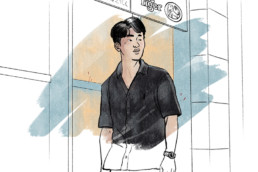
Several months after the launch of Twin Blades, Anton Li, the outspoken owner of the AI start-up Bright Horizons 2.0 and a well-known investor in technology sector from Singapore, reached out to Zanele and told her that as a huge fan of Twin Blades, that he was moved by the story of the game’s development, and felt that the original ambition wasn’t fully realized in the version that’s currently on the market.
Even though Twin Blades generated over USD 100M in revenue (gross, up to date) and was the biggest games hit to come from Africa, Anton believed that there was substantial potential in taking it further and wanted to know if Zanele had any plans to return to the games industry.
When Anton bought the AI start-up in 2018, it was called Bright Horizons 1.0, and it was focused on border control projects. Based on the rumors in the tech circles, the business plan was to develop a way to identify refugees ‘with the specific skin color’ on the approaches to the borders, and then to intimidate them with drones. The founders felt that there’s millions to be made in selling this tech to the EU, with countries in Eastern Europe expressing a particularly strong interest. However, Anton, a self-described ‘pragmatic pacifist’, cancelled all military and paramilitary projects of Bright Horizons and ordered the team to focus on the tools for generating art and code for films and video games.
Anton offered Zanele USD2M to develop the “spiritual successor” (or “the true vision”, depending on how you looked at it) of Twin Blades. The key condition was the use of his novel AI, Bright Horizons 2.0, to produce art and most of the code of the game.
The new game was to become a showcase of how generative AI enables creative people to make their dreams happen with a smaller budget (Anton could afford to invest much more in Zanele’s production, but it was essential for him to prove that a great game can now be made with just USD2M, and not USD40M like another recent hit, Biopunk Funk). Zanele asked for a week to consider the proposal.
11. Pursuing the Dream
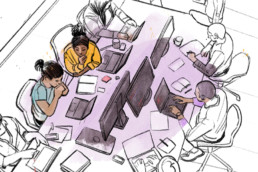
In the early spring of 2023, Anton and Zanele entered into a cooperation agreement.
Zanele registered a new Baharosa company – Quantum Heaven, Inc. – and received the first part of funding from Anton, to develop her “perfect game”.
Zanele named the new project Twin Hearts, after the painting that Ricardo gave her shortly before he perished.
Zanele hired a relatively small team, 10 developers and several outsource crews. One of the key requirements for the candidates was an intimate knowledge of the original Twin Blades.
The cooperation with Bright Horizons 2.0 helped Zanele accelerate the production process at a fraction of the cost, even though the quality of the assets suffered. For example, the AI tool couldn’t match the quality of the art style developed by Rohan at Red Dawn, even though some generated models turned out to be quite decent.
Neither Anton nor Zanele perceived it as a serious issue. Zanele genuinely believed that her in-game systems and mechanics, when done properly, would easily compensate for the imperfections of the art assets; as to Anton, he was very impressed by Zanele’s work ethics and commitment to the project.
Incredibly, the production of Twin Hearts was finished within a year. And while Zanele relied on the help of a babysitter, she managed to avoid any production crunches and was especially proud of spending every night at home, with her daughter Chaniya.
12. The Release
As Twin Hearts approached its release date, Anton aggressively invested in marketing and communications (his budget was USD4M, a 2:1 match for production), positioning the upcoming game as a revolution in AI-supported production.
A demo of Twin Hearts premiered on Gas, the world’s number one games platform, and stories about Zanele and her team appeared in magazines, and even on TV shows. Zanele was invited to speak at Gas Dev Days on a panel of releasing successful independent games with the leverage of external investments.
Once a demo of Twin Hearts became available, both journalists and players noticed the similarities between Twin Blades and Twin Hearts. When asked for comments, Liam Dube at Red Dawn responded that Zanele’s new project will fail, because “the plagiaristic output of AI tool cannot be compared to the talent and direction of studios like his; the human touch in art is simply irreplaceable.”
“Moreover, – said Liam, – what’s the point in playing Twin Hearts when the world already has Twin Blades – and will in a few years see the sequel, Twin Blades 2?”
However, despite Liam’s skepticism (and, perhaps, thanks to the promotional efforts of Anton), Twin Hearts – released cross-platform with full support for 36 languages, and a policy of localized fair pricing, – became an immediate success. Its three-week takeover of the front page of Gas was simply unprecedented (Gas had to go on record to explain that this is how the algorithm works, and nobody at the platform, even its famous founder Nebag Lewen, had the password to override the selection).
The first month of sales alone brought Quantum Heaven more than USD100M in revenue (gross), matching the lifetime earnings of Twin Blades. Zanele’s vision was validated, as was Anton’s ambition to re-program an operation that aimed to automate intimidation of refugees into an operation that aimed to automate production of entertainment.
13. The Success, and The Controversy
The media rated Twin Hearts at 10/10, and the game was nominated for several prestigious awards. Zanele was elected as the chairwoman of the Caribbean Games Industry Association, and a board member of the influential association “Women Who Create.”
Meanwhile, the situation at Red Dawn took a turn for the worse.
Deus Que Joga (DQJ), a major media investment vehicle from Brazil that greenwashed profits from mining and deforestation projects, was in the process of negotiating the purchase of a 30% stake in Red Dawn for USD50M. However, after the launch of Twin Hearts, the negotiations have stalled, because the fund was questioning if the sequel of Twin Blades could ever outperform Twin Hearts.
Moreover, DQJ insisted that Red Dawn submits a plan on how they, too, plan to implement generative AI in their production (around that time, DQJ updated its motto from “Green, Sustainable, Fair” to “Green, Sustainable, AI-powered”). Liam and Rohan flat-out refused to discuss this, and angrily terminated the negotiations.
Once the period of exclusivity of Twin Blades with Mega ended, the game was finally released on Gas – but it never made the front page, as the platform’s audience was too busy with Twin Hearts to notice that Twin Blades was also now available in the same store.
Red Dawn’s founders didn’t like this and considered it a conspiracy funded by Anton and Zanele to defraud them of a proper release spotlight on Gas, an act of revenge for needing to take the exclusive deal with Mega earlier on (Gasket Corp., the owner of Gas, didn’t comment on these allegations).
Bitterly, Rohan blasted Twin Hearts on Blue Sky for “stealing the studio’s audience with some cheap-ass slop from Asia.”
Meanwhile, Liam emailed Zanele with a request to take Twin Hearts down from the Gas platform immediately, since she is infringing their studio’s rights. Zanele refused to de-list the product, saying that this was not a copy, and moreover, the original prototype of Twin Blades was of her own making – so how can she copy what she herself has created?
Even though Twin Blades was commercially successful and continued to receive more awards for its art style, Liam and Rohan were unhappy: just when they got used to basking in the limelight, they found themselves in the shadow of Zanele’s success.
14. The Tragedy
To distract themselves from the unfolding drama, Liam and Rohan dived into the development of the sequel to Twin Blades.
Around the same time, Red Dawn was nominated for BAFTA Global, with an invitation to speak at the awards ceremony (despite the award being global, the ceremony still took place in London). While Liam’s visa application was rejected (he found that being a rich Marzarian did not change the fact that he was still just a Marzarian in the eyes of the western embassies), Rohan managed to receive a single entry short-term British visa thanks to the clerk at the British embassy being a fan of Twin Blades and recognizing his name.
Rohan traveled to London collect the studio’s prize.
Unfortunately, shortly after the arrival to the UK, and speaking at the award ceremony, Rohan fell sick with his fourth case of SARS2, which put him into the Nuffield Health Parkside Hospital with a bad case of antibiotic-resistant pneumonia. There, he died of sepsis and multiorgan failure, two weeks later, all alone.
Rohan’s death was a terrible blow for Red Dawn and for Liam personally; he lost his focus and slid into a highly volatile emotional state. Sometimes he would spend his whole day in bed. Other days, he would get up early, drink a jar of coffee and plan his and his studio’s future.
That future included filing a lawsuit against Zanele.
15. The Lawsuit
- In late 2024, Red Dawn filed a lawsuit against Quantum Heaven in Baharosa, arguing that:
1. Twin Hearts infringes on Red Dawn’s intellectual property rights by willful, intentional, and purposeful cloning of Twin Blades and distributing it in disregard of, and indifferent to, Red Dawn’s rights;
2. Quantum Heaven has committed unlawful, unfair, and/or fraudulent business acts by copying Red Dawn’s Twin Blades game and introducing it to the marketplace. This act was intended to injure Red Dawn, and has injured Red Dawn by unfairly using Red Dawn’s own development efforts and consumer goodwill to capture the audience of Twin Blades.
- Red Dawn asked to:
1. Permanently enjoin Quantum Heaven and all other persons or entities who are in active concert or participation with Quantum Heaven from continuing to infringe Red Dawn’s intellectual property rights, and continuing to engage in unlawful, unfair, and/or fraudulent business conduct;
2. Order Quantum Heaven to remove each and every version of Twin Hearts, and similarly infringing games, from distribution and to cease developing and supporting those games;
3. Award Red Dawn statutory damages for willful copyright infringement of USD300,000; or, in the alternative, at Red Dawn’s election pursuant to Copyright Code of Baharosa, Red Rawn’s actual damages and Quantum Heaven’s profits from infringement, in amounts to be proven at trial;
4. Award Red Dawn statutory damages for unlawful, unfair, and/or fraudulent business conduct in an amount to be determined by multiplying the number of violations found to be committed by USD5,000, pursuant to Business & Professions Code of Baharosa.
- The lawsuit is filed in Baharosa.
COUNTRIES
Marzaria
- A country in the Northern Africa.
- Formerly occupied by the kingdom of Italy (under Mussolini).
- The legal system is based on the Italian (continental) law.
Baharosa
- A country in the Caribbean Sea.
- Formerly occupied by USA (under Wilson).
- The legal system is based on the American (case) law.
COMPANIES
Red Dawn Entertainment s.r.l.
A games studio; developer of Twin Blades; operating from Marzaria.
Quantum Heaven, Inc.
A games studio; developer of Twin Hearts; operating from Baharosa.
Bright Horizons 2.0 LLC
A software developer focused on AI tools; operating from Singapore.
PEOPLE
Zanele Mbali
- Game designer, born in South Africa.
- Former employee of Red Dawn (worked on-site from Marzaria).
- Founder of Quantum Heaven (currently a resident of Baharosa).
Oskar Nilsson
- Stock trader, born in South Africa; died in South Africa.
- Former first husband of Zanele Mbali.
Dr. Ricardo Vargas
- Doctor, pediatric surgeon, born in Baharosa; died in South Africa.
- Studied at University of Havana’s medical school (Cuba).
- Worked at the Red Cross War Memorial Children’s Hospital (Cape Town, South Africa).
- Former second husband of Zanele Mbali.
Dr. Ignacio Dube
- Doctor, oncologist, born in Marzaria.
- Studied at University of Havana’s medical school (Cuba).
- Works at Hospital Clínico Quirúrgico “Hermanos Ameijeiras” (currently a resident of Cuba).
- A close friend of Dr. Riardo Vargas. An uncle of Liam Dube.
Liam Dube
- Producer, born in Marzaria.
- Co-founder and CEO of Red Dawn (currently a resident of Marzaria).
Rohan Rao
- Artist, born in Marzaria; died in the UK.
- Co-founder and Art Director of Red Dawn (worked on-site from Marzaria).
Chaniya Vargas
- Daughter of Zanele Mbali and Ricardo Vargas.
- Born in Baharosa in 2022.
Anton Li
- Investor and visionary, born in Russia to Sino-Korean parents.
- Inherited a fortune made by his parents in the ’90s.
- A self-described ‘pragmatic pacific’, a vocal opponent of war in any form.
- Owner of Bright Horizons 2.0 (currently resides in Singapore).